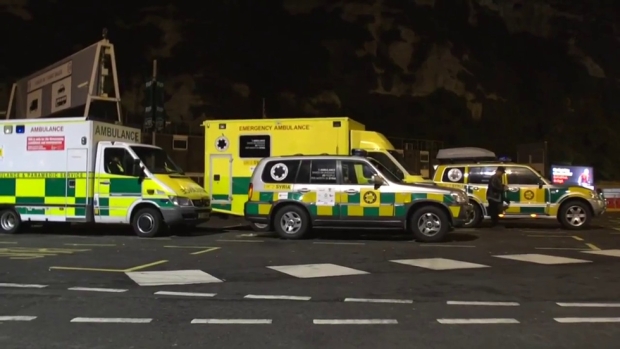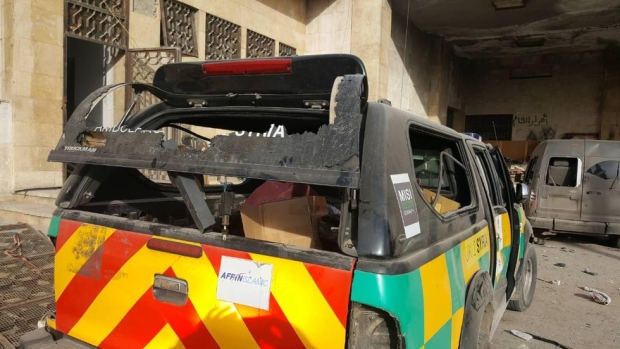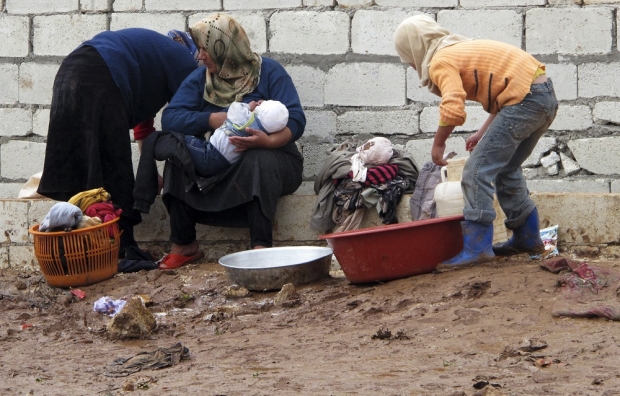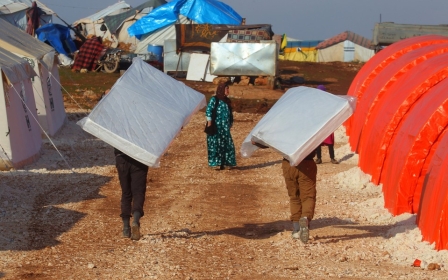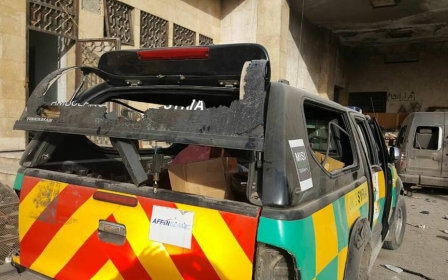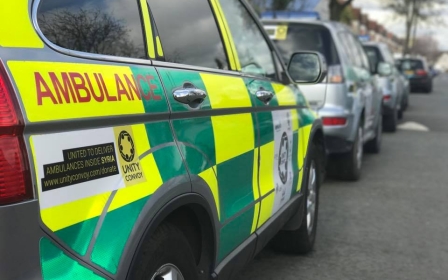Missing money: How British police used cash seizures to disrupt Syrian aid convoys
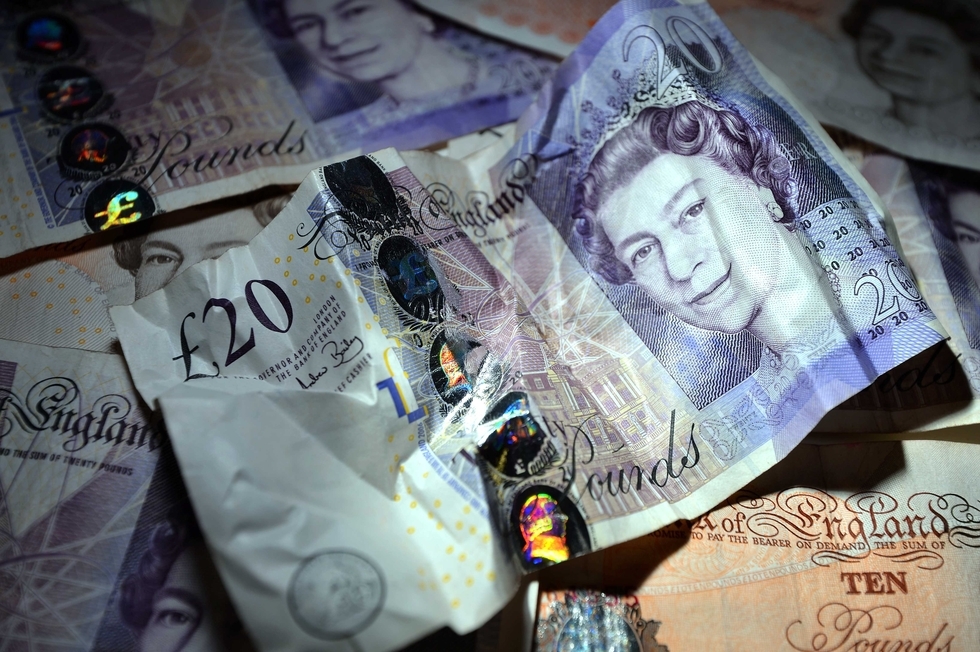
Charity money confiscated by British police from Syria-bound aid convoys may have been shared between the police force that seized the funds and the Home Office under a controversial cash forfeiture scheme.
Kent Police said in August 2014 that it had seized £107,000 ($143,000) from convoys passing through the port of Dover in southern England over the previous two years amid concerns that money being sent from the UK was being used to fund terrorism-related activities in Syria.
Nobody was ever prosecuted over the cash seizures and Kent Police now says it believes that most of the money was charity income.
It also acknowledges that not all of the funds have been returned but says that revealing what happened to the money would undermine national security and potentially increase the threat of a terrorist attack in the UK.
The £107,000 total included about £45,000 ($60,000) in pound, dollar and euro banknotes confiscated five years ago from participants in a mass convoy which departed from Dover on 23 December 2012.
Nine men were subsequently arrested and a further £41,000 ($55,000) seized in house raids, some carried out by counter-terrorism police, as part of a four-year investigation which focused on individuals with links to Aid Convoy, a London-based charity established in 2012 with the aim of delivering aid to rebel-held areas of Syria.
Being a Muslim charity worker or volunteer will always make you a target for the police. You’re guilty until proven innocent
- Usman Ali, former Aid Convoy trustee
The investigation was eventually closed without any prosecutions being brought, but Usman Ali, a former Aid Convoy trustee and one of those arrested, said he had spent years attempting to get back charity funds taken from his home and from volunteers on the convoy.
“Being a Muslim charity worker or volunteer will always make you a target for the police. You’re guilty until proven innocent, especially if your work is related to the Syrian crisis,” Ali told Middle East Eye.
Kent Police confirmed to MEE that no charges had been brought in relation to the Aid Convoy case or the larger sum of £107,000. It also said it had determined that the majority of the cash was “collected from the public and amounts to charity income and other monies from unknown origins”.
“Kent Police is in the process of ensuring that charity income is rightfully and appropriately restored for the purpose of which it was originally obtained and that any other legally obtained funds are returned to those it was confiscated from,” a spokesperson told MEE.
Valuable police 'intelligence'
But the police force has repeatedly declined to confirm exactly how much of that money has been returned, or whether any of it was ultimately forfeited.
In response to a series of freedom of information requests, Kent Police said it could not confirm or deny whether any money had been forfeited as doing so would “provide those intent on committing criminal or terrorist acts with valuable police ‘intelligence’... thereby undermining national security and leaving the United Kingdom at risk of further terrorist attack”.
MEE pressed Kent Police further, arguing that it was in the public interest for the force to reveal if it continued to hold money, most of it raised in British Muslim communities, whose donors had intended it to help fund relief efforts and potentially save lives in Syria.
The fact that not all of the money has been returned raises the possibility that some of it may have been forfeited through the UK government's Asset Recovery Incentivisation Scheme (ARIS), which allows police forces and the Home Office to share money seized on the grounds that it is suspected of being the proceeds of, or intended to fund, criminal activity.
The Proceeds of Crime Act (POCA) gives police forces the power to confiscate cash sums upward of £1,000 ($1,300) which they suspect has come from or is intended to be used to commit crime.
Police can then apply for a court order for the cash to be forfeited even if no criminal case is brought, and if no appeal is lodged the money is then transferred into a Home Office bank account.
Through ARIS, the money is then shared out with the Home Office retaining 50 percent, and the rest returned to the police force that seized it, or split with other public bodies involved in investigations.
'Abuse of position'
Lawyers with experience of POCA proceedings say that cash seizures are notoriously difficult to challenge and that the system is open to abuse by police forces who stand to gain financially from cash seizures.
They say that money is sometimes forfeited for no other reason than the effort and expense involved in seeking to get it back from the police.
Aziz Rahman, a solicitor at law firm Rahman Ravelli which specialises in POCA cases, said there was usually no legal aid available to fight cash seizure cases, which go through the civil court system, and that recovering amounts up to about £2,000 ($2,700) could even leave individuals or charities out of pocket.
“There are some clients who say, ‘Well, I haven’t done anything wrong. I can afford it, I want to fight it. I want the money back but I also want to clear my name’,” Rahman told MEE.
The police tend to pursue it very aggressively knowing that if they are confiscating a small amount from a small man then he is not going to fight it
- Aziz Rahman, Lawyer
“But if you don’t have the resources then it is a problem because what do you do? You can’t afford to pay lawyers to do it and legal aid is virtually non-existent.”
Rahman said that some police forces had identified ARIS as a way of raising money and that in some cases investigators were paid bonuses based on the amount of revenue they brought in via forfeiture orders.
“Because of the incentivisation scheme [a police force] may think, ‘Hang on, we could have some budget here’, so they tend to pursue it very aggressively knowing that if they are confiscating a small amount from a small man then he is not going to fight it. So it is a bit of an abuse of position,” said Rahman.
Cash forfeiture orders have brought in an average of £40m ($53.5m) a year over the past five years, according to figures published by the government in September, with the Home Office earmarking its half of ARIS funds as part of its core budget.
Earlier this year, the Charity Commission, which regulates charities in the UK, and SO15, the Metropolitan Police’s counter-terrorism unit, issued a bulletin warning charities operating overseas that they risked the “permanent loss of funds” if they continued to use cash couriers.
Participants in aid convoys argue that it is easier to use cash to pay for fuel, tolls and other contingency expenses incurred on route which can run into many thousands of pounds for convoys numbering dozens of vehicles.
Some volunteers in early convoys, some attached to charities but others operating as freelance fundraisers, also carried cash with the intention of buying aid supplies in Turkey or passing the money on directly to those involved in aid work in Syria.
Some of those involved acknowledge that mistakes were made at the time because of the urgency of the work, the scale of the donations that they received and their lack of experience.
Money could be lost
But Dean Haydon, SO15’s commander, said: “Cash couriering is a high risk activity for any organisation or individual to undertake, and is a method known to be used by terrorists and criminals.
“My advice to all charities is to send money safely and not to use a cash courier; if you do there is a real risk that without proper documentation and a clear explanation of the source and destination of the cash, the cash will be seized by the police and ultimately lost to the charity.”
Concerns about the accountability and transparency of POCA proceedings and the ARIS scheme have been raised by the National Audit Office, the UK’s government spending watchdog, and parliament’s Home Affairs Select Committee which last year said in a report that the system was not fit for purpose.
It also proposed that at least 10 percent of forfeited assets should be “returned or donated to the communities which have suffered at the hands of criminals, for example through charities”.
Charities and individuals caught up in cash seizures say that the loss of money and subsequent police and Charity Commission investigations have had a detrimental impact on their lives, work and reputations regardless of whether the money is ever returned in full.
The way your house is raided, the way your workplace is visited by the police, your local mosque gets a knock on the door about you, it puts you off
- Usman Ali
Ali, the former Aid Convoy trustee, told MEE that police had confiscated a further £25,000 ($33,500) in charitable donations from his house in East London during a raid carried out by SO15 in March 2014 in which he was arrested.
While Ali said that money had been returned earlier this year, he said Aid Convoy was still owed about £7,000 ($9,400) confiscated from volunteers on the December 2012 convoy.
“I believe many people have given up their fight to retrieve any money that they lost because of the aftermath. What I mean is the way your house is raided, the way your workplace is visited by the police, your local mosque gets a knock on the door about you, it puts you off,” he said.
Aid Convoy’s activities were subsequently restricted by a Charity Commission inquiry relating to the cash seizure which was launched in August 2013.
As a consequence, the charity was placed under temporary protective powers which restricted its access to its own funds and required that all financial transactions are approved by the Commission.
In a statement, the current trustees of Aid Convoy acknowledged that mistakes had been made in the charity's early days but said this was partly down to "not understanding what was expected by the authorities and naivete in trying to expedite aid to the victims of the war as fast as humanly possible".
But they said charity officials had cooperated with police and the Charity Commission and had now put in place policies and procedures that were fully compliant with UK charity legislation.
They said all charges against former trustees had been dropped by the police and that the Charity Commission had restored their access to their bank accounts and confirmed in writing that it had closed its investigation.
However, at the time of writing, the Charity Commission has not published its inquiry into Aid Convoy and a spokesperson told MEE that its investigation was ongoing.
"During the investigation Aid Convoy was allowed to continue it work and duly delivered dozens of containers of aid to the victims of war. Aid Convoy looks forward to the issuing of the report and becoming an organisation recognised for helping the disadvantaged,” the trustees said.
Wedding jewellery and heirlooms
A further £26,000 ($34,700) was confiscated in the March 2014 raids from the home of Abdul Aziz Ramzan, an official of a Derby-based charity, the Normanton Youth Organisation, which had links to Aid Convoy and was fundraising on its behalf.
Ramzan told MEE the money was personal savings and said police had also confiscated gold wedding jewellery and other family heirlooms which were subsequently returned. He also said he had suffered depression and panic attacks as a consequence of the raid and the investigation.
We collected cash from the public for a humanitarian cause. People on this island gave sincerely because they felt there was a need
- Abdul Aziz Ramzan
“We collected cash from the public for a humanitarian cause. People on this island gave sincerely because they felt there was a need,” said Ramzan.
“They couldn’t charge us with anything because we were so transparent. But we had to beg for almost four years to have the items returned.”
MEE understands that most money and possessions seized from homes during the March 2014 raids have now been returned and that those arrested were told informally last September that the investigation had been closed. Bail conditions were dropped in May 2016.
But the initial arrests received national news coverage and were subsequently highlighted by Kent Police to discourage individuals from taking part in convoys to Syria.
In a statement in August 2014 citing the confiscated figure of £107,000, Detective Chief Superintendent Chris Hogben said Kent Police would investigate anyone who it suspected of involvement in charity fraud or money laundering.
“We aim to ensure funds given by the public reach their intended destination and are not used in connection with criminal activity or to support terrorism,” said Hogben.
Crackdown on convoys
Dozens of convoys consisting of ambulances and other vehicles packed with medical supplies, food and other aid largely funded by donations from Muslim communities in the UK, departed for southern Turkey and rebel-held northern Syria in 2012 and 2013.
But the number of convoys subsequently dwindled amid a crackdown by authorities over concerns that Britons intent on fighting in Syria were using them as a route into the country, and safety concerns following the kidnapping in December 2013 of Alan Henning, a convoy volunteer from Manchester who was subsequently beheaded by the Islamic State (IS) group in October 2014.
“The method of transporting cash in person is known to be used by criminal and terrorist groups; therefore carrying large sums of cash in person is likely to be viewed suspiciously by the Police and Ports Officers and may be subject to seizure under the Proceeds of Crime Act 2002 – and ultimately lost,” the Charity Commission warned.
More recently, the Commission has highlighted the cases of Syed Hoque and Mashoud Miah who were convicted of funding terrorism last December after they used aid convoys in 2013 to pass on funds to Hoque’s nephew, a fighter with the al-Qaeda-aligned Nusra Front, who had asked his uncle to send him £3,000 ($4,000) to buy a sniper’s rifle.
Another defendant in the trial who was involved in organising and running convoys was acquitted after he told the court that he had been approached by MI5 and offered £30,000 ($40,000) to work for the security service.
“The Commission has been clear that it does not consider aid convoys an effective means of delivering humanitarian aid, and has warned charities taking part in them that they will be subject to additional regulatory scrutiny to ensure trustees comply with their legal duties and responsibilities. The convictions of these individuals highlight how such convoys are susceptible to abuse,” the Commission said.
Since 2014 most charities operating between the UK and northern Syria, including Aid Convoy, have shipped supplies by cargo ship to southern Turkey, relying on local networks to distribute the aid.
Efforts by British charities and humanitarian organisations to send supplies into northern Syria have been further disrupted in recent months because several British aid workers based in the region have been stripped of their citizenship by the government, as exclusively reported by MEE.
MEE understands that several charities have been warned by the Charity Commission and other authorities that they should stop working with the individuals concerned.
'Cash works better'
Charities continuing to run aid convoys from the UK say police are still using cash seizures and other measures to disrupt their work.
Mohammed Tahir Malik, the chief executive of Anaya Aid, a charity which was involved in organising a convoy of more than 100 ambulances in April, said that Kent Police had confiscated 23,000 euros ($27,000) and £1,500 ($2,000) in cash despite the fact that he was carrying receipts proving that the money belonged to the charity and a letter from trustees confirming that he was authorised to carry it.
Malik said the money was intended to cover fuel, road tolls and breakdown costs for more than 40 vehicles during the journey from the UK to Bulgaria, where the vehicles were due to be handed over to volunteers from Syrian partner organisations.
“Whenever you travel you have money for costings. Those costings are fuel tolls and breakdowns. Cash works better. Anaya Aid had over 40 vehicles on that convoy. So what is 23,000 euros?” he told MEE.
Malik said that Anaya Aid, previously known as Buttercup Primary, had been involved in convoys since 2013 and had never had any previous issues with Kent Police and had communicated with a liaison officer from the force while organising the April convoy.
Malik said three volunteers had also had their passports confiscated while others were questioned for six hours by police at Dover under Schedule 7 counter-terrorism powers. Several vehicles were also stripped down and searched by dogs.
Some volunteers were visited at home by counter-terrorism police prior to the convoy’s departure and warned about travelling to Turkey or Syria, despite the fact that participants only planned to travel as far as Bulgaria.
“We’d never had a problem with Kent Police. Our relationship has always been good. Nobody’s been arrested and nothing had been confiscated. The money was taken out of Anaya Aid's account which we had receipts for. We were absolutely stunned when they took the money off us, but we realise what is going on here,” said Malik.
Malik and another Anaya Aid trustee had however previously had £5,000 ($6,700) in cash confiscated from them when they were taken off a plane at London’s Heathrow Airport and prevented from flying to Turkey in December 2015, although that money was subsequently returned to the charity.
Malik said Kent Police had told him that it would also return the money seized in Dover but had not yet done so.
MEE asked Kent Police to clarify what had happened to the money taken from Anaya Aid, but it did not offer a response.
The Charity Commission in July opened an inquiry into Anaya Aid as a consequence of the cash seizures, saying that trustees had “put charity funds at risk of loss”.
“The 2017 cash seizure came despite the Commission having previously provided the trustees with regulatory advice and guidance against cash couriering, which was not followed,” it said in a statement.
A Charity Commission spokesperson told MEE that it could not comment on its investigation into Anaya Aid as it was ongoing and reiterated that charities which continued to use cash couriers risked losing donor money.
"The Commission has strongly advised charities against using cash couriers and has highlighted the risks of money being seized and forfeited if it is moved in this way. Cash seizures can prevent charitable funds being applied for their intended purposes and impact on the charities’ activities or the loss of donor money," the spokesperson said.
MEE asked the Home Office to confirm whether any money confiscated from Syrian aid convoys had ended up in its bank accounts.
A spokesperson said it would be inappropropriate for the Home Office to comment while Kent Police's enquiries were ongoing. But he said al-Qaeda and the Islamic State (IS) group had "sought to take advantage or have stolen from charities in order to fund their murderous campaigns".
MEE asked Kent Police again to confirm whether any money seized from convoys had been retained and redistributed via the ARIS scheme.
But a spokesperson said it was unable to provide any further information for the same reasons explained in Kent Police's response to MEE's freedom of information response.
"Kent Police is in the process of ensuring that charity income is rightfully and appropriately restored for the purpose of which it was originally obtained and that any other legally obtained funds are returned to those it was confiscated from. This is on-going in consultation with the individuals, the charities and/or the Charity Commission," the spokesperson said.
Middle East Eye propose une couverture et une analyse indépendantes et incomparables du Moyen-Orient, de l’Afrique du Nord et d’autres régions du monde. Pour en savoir plus sur la reprise de ce contenu et les frais qui s’appliquent, veuillez remplir ce formulaire [en anglais]. Pour en savoir plus sur MEE, cliquez ici [en anglais].


